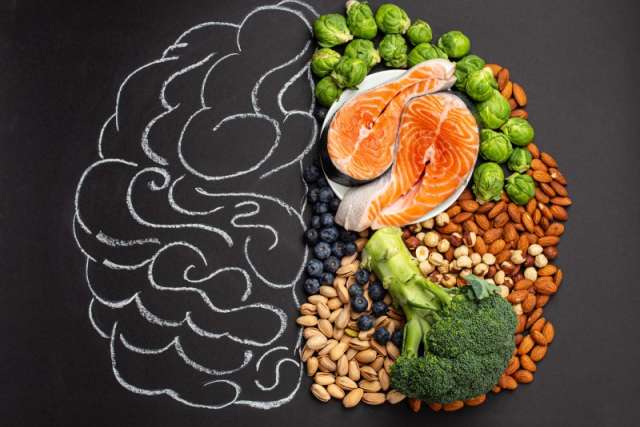If you struggle with mood changes and other behavioral health issues, there’s a chance that your diet has something to do with it.
“Animal and human studies show us that the brain and gut microbiome are intimately connected,” said Arpana “Annie” Gupta, PhD, co-director of the Goodman-Luskin Microbiome Center at UCLA. “When most people think about mental health, they only think about the brain, but there is bi-directional communication between the gut and brain. I tell people the gut and the brain are like BFFs. The brain and the gut are in constant communication with each other.”
It is a complex relationship that involves four main channels of communication between the brain and gut, Dr. Gupta explained.
- The vagus nerve acts as a communication highway between the brain and gut;
- Gut microbes produce chemicals and metabolites that circulate in the blood to the brain;
- Gut microbes play an important role in inflammation and the immune system by controlling what is circulated in the body and what is excreted from the body;
- Endocrine cells produce hormones, neuropeptides and neurotransmitters.
Neurotransmitters are not only produced in the brain, but are also produced by gut cells. “Serotonin is one of those neurotransmitters that is associated with mental health, and it’s produced by good bacteria. Up to 95% of serotonin is produced in the gut, so, we have to eat healthy foods to increase the presence of these good bacteria,” Dr. Gupta said.
What is the gut-brain system, and how does diet affect it?
The gut-brain system involves two-way communication between the central and enteric nervous system and links emotional and cognitive centers of the brain with peripheral intestinal functions. So when you’re nervous and experience “butterflies” in your stomach, there’s more actually going on than just the sensation that the term suggests.
The enteric nervous system (ENS) is referred to as our body’s “second brain” or “gut brain,” and facilitates gastrointestinal function. The ENS also sends signals to the brain that trigger changes in our mood, emotions and cognitive function.
“We’re starting to recognize more that the nutrients we get from healthy foods and beverages can enable us to think more clearly and feel better,” said Shelby Yaceczko, RD, a registered dietitian in the UCLA Vatche & Tamar Manoukian Division of Digestive Diseases. “When somebody’s diet is rich with things like antioxidants, phytonutrients and fiber, we know that person is going to get a variety of different vitamins and minerals that support anti-inflammatory properties of the body. Those properties are then going to beneficially alter the neurotransmitters, which in turn affects mood and cognition.”
Good foods to feed the gut-brain axis
Increasing your intake of probiotic and prebiotic foods are important to improving the gut-brain interaction. Natalie Gavi, RD, a registered dietitian with the UCLA Steve Tisch BrainSPORT Program, pointed out several beneficial probiotic foods and beverages:
- Yogurt
- Sauerkraut
- Kefir
- Miso
- Tempeh
- Kombucha
- Kimchi
The fresher, the better, Gavi said. “It’s important to get foods like this from the refrigerated section of the grocery store so their beneficial bacteria remain intact and have not been destroyed, as they are when the food is canned or processed.”
Gavi advises that probiotic foods are most effective when the diet also includes prebiotic-rich foods, which serve to feed the good bacteria in probiotic foods. Prebiotic foods include:
- Asparagus
- Apples
- Jerusalem artichokes
- Bananas
- Oats
- Onions
- Garlic
- Leek
Processed foods can have undesirable effects on the brain
“There are studies that show the connection between highly processed foods and depression and anxiety,” Gavi said. “However, I’m always cautious when telling people to limit or restrict certain foods. That can add to their stress, which can lead to binge eating and also affect the gut microbiome.”
Even so, there are certain types of foods that have been clearly linked to depression. These include what are known as ultra-processed foods, or UPFs. UPFs consist of carbonated drinks, sweet or savory packaged snacks, processed meats, candy, and fried fast food. Enjoying such food occasionally won’t have a negative impact on your mental health or mood, as long as you’re following a healthy dietary pattern, said Gavi.
Though the relationship between diet and mental health is complex, Dr. Gupta said the correlation is clear. “If you have an unhealthy gut microbiome, chances are you will have an unhealthy brain,” she said. “If your microbiome is healthy, your brain is going to be healthy. When we think of mental health, we have to think about our gut as well.”
Help Shape the Future of Mental Health by Joining the UCLA Mental Health Research Registry





